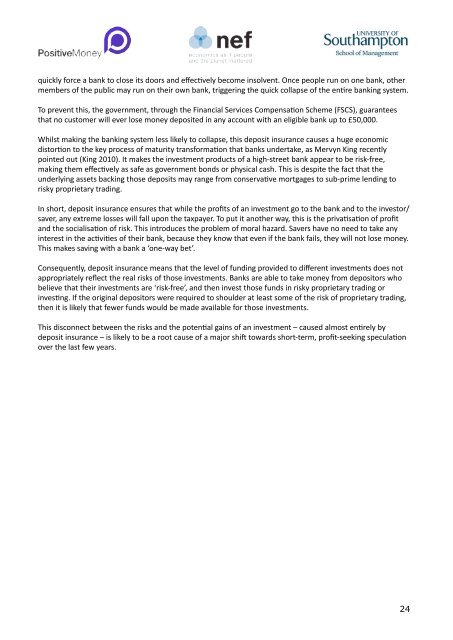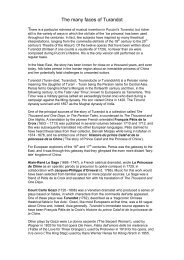NEF-Southampton-Positive-Money-ICB-Submission
NEF-Southampton-Positive-Money-ICB-Submission
NEF-Southampton-Positive-Money-ICB-Submission
Create successful ePaper yourself
Turn your PDF publications into a flip-book with our unique Google optimized e-Paper software.
quickly force a bank to close its doors and effecGvely become insolvent. Once people run on one bank, other<br />
members of the public may run on their own bank, triggering the quick collapse of the enGre banking system.<br />
To prevent this, the government, through the Financial Services CompensaGon Scheme (FSCS), guarantees<br />
that no customer will ever lose money deposited in any account with an eligible bank up to £50,000.<br />
Whilst making the banking system less likely to collapse, this deposit insurance causes a huge economic<br />
distorGon to the key process of maturity transformaGon that banks undertake, as Mervyn King recently<br />
pointed out (King 2010). It makes the investment products of a high-‐street bank appear to be risk-‐free,<br />
making them effecGvely as safe as government bonds or physical cash. This is despite the fact that the<br />
underlying assets backing those deposits may range from conservaGve mortgages to sub-‐prime lending to<br />
risky proprietary trading.<br />
In short, deposit insurance ensures that while the profits of an investment go to the bank and to the investor/<br />
saver, any extreme losses will fall upon the taxpayer. To put it another way, this is the privaGsaGon of profit<br />
and the socialisaGon of risk. This introduces the problem of moral hazard. Savers have no need to take any<br />
interest in the acGviGes of their bank, because they know that even if the bank fails, they will not lose money.<br />
This makes saving with a bank a ‘one-‐way bet’.<br />
Consequently, deposit insurance means that the level of funding provided to different investments does not<br />
appropriately reflect the real risks of those investments. Banks are able to take money from depositors who<br />
believe that their investments are ‘risk-‐free’, and then invest those funds in risky proprietary trading or<br />
invesGng. If the original depositors were required to shoulder at least some of the risk of proprietary trading,<br />
then it is likely that fewer funds would be made available for those investments.<br />
This disconnect between the risks and the potenGal gains of an investment – caused almost enGrely by<br />
deposit insurance – is likely to be a root cause of a major ship towards short-‐term, profit-‐seeking speculaGon<br />
over the last few years.<br />
24



